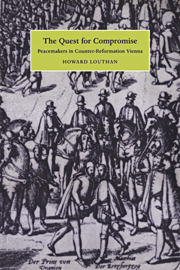Book contents
- Frontmatter
- Contents
- List of illustrations
- Acknowledgments
- A political and cultural chronology
- List of abbreviations
- Introduction
- PART I THE EMERGENCE OF AN IRENIC COURT
- PART II MAXIMILIAN II AND THE HIGH POINT OF IRENICISM
- PART III THE FAILURE OF IRENICISM
- Introduction
- 7 Confessional ambiguity and unambiguous critics: religion and the Austrian middle way
- 8 The funeral of Maximilian II: struggling for the soul of central Europe
- 9 Matthias in the Netherlands: the political failure of irenicism
- Conclusion: Storm clouds on the horizon: from the great milk war to the Thirty Years War
- Epilogue: The wider circle of irenicism
- Select bibliography
- Index
- CAMBRIDGE STUDIES IN EARLY MODERN HISTORY
8 - The funeral of Maximilian II: struggling for the soul of central Europe
Published online by Cambridge University Press: 03 December 2009
- Frontmatter
- Contents
- List of illustrations
- Acknowledgments
- A political and cultural chronology
- List of abbreviations
- Introduction
- PART I THE EMERGENCE OF AN IRENIC COURT
- PART II MAXIMILIAN II AND THE HIGH POINT OF IRENICISM
- PART III THE FAILURE OF IRENICISM
- Introduction
- 7 Confessional ambiguity and unambiguous critics: religion and the Austrian middle way
- 8 The funeral of Maximilian II: struggling for the soul of central Europe
- 9 Matthias in the Netherlands: the political failure of irenicism
- Conclusion: Storm clouds on the horizon: from the great milk war to the Thirty Years War
- Epilogue: The wider circle of irenicism
- Select bibliography
- Index
- CAMBRIDGE STUDIES IN EARLY MODERN HISTORY
Summary
Ten years ago he [Maximilian] said to the bishop of Olomouc, “No sin is more serious than the desire to tyrannize in matters of conscience.”
(Johannes Crato)Above all he defended our most sacred religion which is justice in God and the proper worship of Him.
(Bishop Lambert Gruter of Wiener Neustadt)While attending the Reichstag in Regensburg an ailing Maximilian died in the early hours of 12 October 1576. The religious strains in central Europe were reflected by a series of conflicting reports of the emperor's death. Rival Protestant and Catholic accounts of Maximilian's final hours quickly circulated throughout the continent. According to Stephen Gerlach two official funeral addresses were written in the emperor's honor. One was composed by Johannes Crato, while the other was drafted by Lambert Gruter, the bishop of Wiener Neustadt. The introductory citations from the two respective orations aptly capture the contrast between the irenic and Counter-Reform factions at the imperial court. The death of Maximilian II offered both parties an opportunity to express their vision of the dynasty. By examining these two dissonant voices, we can more clearly see the antithesis between irenicism and its Counter-Reform rival. Though the funeral ritual employed a broad arsenal of imperial symbols and images and was contingent on a number of factors, the orations were emblematic of two increasingly divergent world views. The events of 1576–1577 illustrate both the weakness of a Habsburg via media and the appeal of a renewed and revitalized Catholic church.
After the emperor's death Crato returned home to Breslau, and there three months later he published his eulogy in Maximilian's honor.
- Type
- Chapter
- Information
- The Quest for CompromisePeacemakers in Counter-Reformation Vienna, pp. 134 - 142Publisher: Cambridge University PressPrint publication year: 1997



